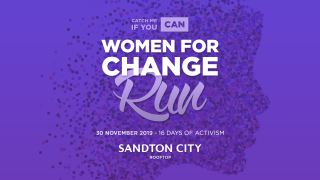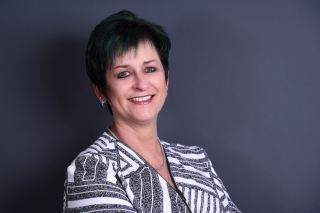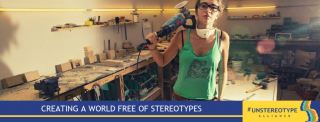Sandton City hosts the Woman for Change Run to drive awareness on violence against women and children
Sandton City is thrilled to host the Women for Change Run that will be taking place on the 30th of November 2019. Women for Change is a call to unify and drive awareness regarding violence against women and children in South Africa through the annual Women For Change 5 and 8km Run starting and finishing on the Sandton City rooftop.
The Women For Change movement was founded by ‘Catch Me If You Can’, South Africa’s largest all-women running community.
Amelia Beattie, Chief Executive of Liberty Two Degrees (L2D) which co-owns Sandton City has recently been named as an Ambassador of Women For Change. Beattie’s passion for running, together with her determination to make a difference for women, children and the environment alike makes her the perfect example of a woman who endorses change in her daily personal and business undertakings. This is not only seen through her individual actions but is also reflected through the impactful changes she is making in the L2D portfolio.
“We are honored to be the launching point for an initiative that strengthens gender-based violence prevention and raise awareness of violence against women and children, while actively engaging our communities in this effort. Part of the building blocks that position our portfolio for the future is community place making and it is truly inspiring to see a community of ladies come together at Sandton City in the name of change, for a cause this significant,” Beattie states.
Catch Me If You Can has chosen their annual run to raise awareness during the 16 Days of Activism campaign which is held from 25 November until 10 December 2019.
“We will come together. We will not be silent. We will stand for what we believe in.” Sabrina Walter, Founder of CMIYC
Join the Women For Change 5/8km Run on Saturday, 30 November 2019 at Sandton City Rooftop and run with us united against Gender Based Violence. Tickets available online: http://shop.cmiyc.co.za/product/women-for-change-jhb2019/or at Sportsman’s Warehouse Sandton City Mall from 1 September 2019. Join the movement #WomenForChange
Stop the Senseless Gender-Based Violence - Motor Industry Staff Association
The Motor Industry Staff Association (MISA) condemns in the strongest possible terms the scourge of gender-based harm so prevalent in our society and is calling on Government to act on the senseless and violent crimes committed against women in particular.
“We can no longer stand back and allow our country’s women to be discriminated against, harmed, harassed, abused, assaulted, raped and murdered as just another statistic in a country where self-enrichment seems to take preference over social justice and the basic human rights enshrined in our Constitution,” says Martlé Keyter, MISA’s CEO: Operations.
“We abhor all forms of violence, abuse and discrimination against any person regardless of their gender, sexuality, race or nationality.
“The time for idle and vague promises has passed. Decisive and strong leadership is required to eradicate gender-based harm,” says Keyter.
The trade union, which represents close on 50 000 employees in the South African retail motor sector, is pleading with Government for a normalised society in which everyone feels safe and secure.
“No woman should be threatened or at risk or be subject to cowardly violence. The State should now take the very real threat on the lives and livelihood of all women in South Africa seriously and implement measures that will restore the basic values so lacking in our disturbed society,” Keyter maintains.
“We are enraged by the harm that afflicts women in South Africa every day of the year. We condemn those who encourage gender-harm. We are appalled by the lack of political leadership and we deplore the physical, sexual, psychological or economic suffering inflicted on women.”
MISA says it is time to hold to account the perpetrators of gender-based harm, to change the attitudes, behaviour and culture of people in society that promote the culture of sexism and patriarchy.
For more information on MISA, visit www.misa.org.za
A New Attitude: UnStereotyping Advertising: Men should feel powerfully emboldened to be counted as feminists
As the Women’s Decade 2010-2020 of the African Union draws to a close, women the world over are standing firm in their push for gender equality – and they want men to walk and work with them, to change perceptions of how women are viewed, and implement changes right where they are. This is at the very core of the United Nations HeForShe campaign www.heforshe.org – a place where men can feel powerfully emboldened to be part of the movement and the solution.
The strides governments are making are laudable, says Anne Githuku-Shongwe, Representative at the United Nations Women South Africa Multi-Country Office. However, the real work of gender equality has to continually happen in our communities, in our thinking, in our advertising and our perceptions of women. “That’s what the United Nations HeForShe campaign is all about,” she says. “Taking personal responsibility and change that will cascade into thought and community change.” “With the advertising industry, we’ve created the Unstereotype Alliance, and we’re really challenging private companies who spend billions on advertising to make sure that every single advert that goes out does not stereotype or reinforce images of women as weak or as sexual objects, but actually promotes the image of the future that we really want, which is one where gender equality thrives,” explains Githuku-Shongwe.
The Unstereotype Alliance is a thought and action platform which uses advertising as a force for good to drive positive change. It seeks to eradicate harmful gender-based stereotypes in all media and advertising content. Convened by UN Women, the Unstereotype Alliance contributes to empowering women in all their diversity (including race, class, age, ability, ethnicity, religion, sexuality, language and education) and addressing harmful masculinities to help create a gender equal world.
The Loeries, the globally recognised awards for the advertising and communications industry across Africa and the Middle East, are Ally Members the Unstereotype Alliance. One aim is to engage with communications students through a dedicated Unstereotype Alliance and HeForShe Facebook Challenge http://bit.ly/2QLhbFL. “We really want students to engage themselves on the issue of stereotyping. If we can begin to impact on students who themselves are moving into this creative industry that shapes how we believe men and women should be in society, if we can start changing that, and every billboard that comes up, every ad that is on the table, imagine what that would do? A strong woman with a strong man, positive families. These are the images we want portrayed. And just one powerful ad can make such a difference.” “This is the kind of conversation that we want to have at Loeries Creative Week in August this year, with men who are not ashamed to promote feminism, and who can stand and be counted as a feminist.
We’ve got to impact everywhere there are influencers. Creatives are influencers, so if we can influence the influencers to influence the world, then we’re really influencing.” Anne Githuku-Shongwe explains that “in much of Africa and the Middle East, gender-based violence is normalised. It actually should be considered a state of emergency, the way you would deal with a cyclone or other disaster, because really there is a serious issue here. Rape in particular, and sexual violence, is prevalent in many countries, and it’s an area that really has to be dealt with because women will make progress in their education and in their economic advancements, but then they get into a situation of rape or some form of violence from a loved one, and all of that reverses,” she laments.
Gender equality has to go far beyond just the number of women who sit in high positions, it has to translate to having actual impact on women’s lives. Economically, governments spend billions on procurements every year. “Barely one percent of that goes to towards women-owned businesses. Barely! And that’s a global average,” says Githuku-Shongwe. “Just imagine if 50 percent of government procurement went to women-owned businesses? That would transform the world, because we know that women-owned businesses employ more people and impact on more people just because automatically they are households.
So the economic upliftment of women is not something to do just because it’s cute, it actually makes transformational economic sense. It’s good business actually. And it starts with changing the way women are viewed and treated.” Anne Githuku-Shongwe will be speaking at the Unstereotype Alliance Masterclass as part of Loeries Creative Week, 22-25 August. More info can be found at Loeries.com.
Major Partners: DStv Media Sales, Gearhouse
Category Partners: AB InBev, Barron, Brand South Africa, Facebook, Gagasi FM, Google, JCDecaux, Nando’s, Tsogo Sun, Vodacom, Woolworths
Additional Partners and Official Suppliers: AAA School of Advertising, Antalis South Africa, Aon South Africa, Backsberg, BEE Online, First Source, Fresh RSVP Guest Logistics, Funk Productions, Gallo Images, Grid Worldwide, Hetzner, Mama Creative, Newsclip, Paygate, Rocketseed, Shared Value Initiative, Shift Social Development, Vega School, VQI Communications Nigeria
Endorsed by: Association of Communication and Design, Brand Council South Africa, Commercial Producers Association, Creative Circle, EXCA, IAB, South African Institute of Architects, IID
Official Media Partners Bizcommunity.com, Book of Swag, Brand Communicator Nigeria, Business Insider by Pulse, Campaign Middle East, Film & Event Media, Modern Marketing,The Redzone. Twitter: @loeries Instagram: Loerieawards Facebook: The Loeries
Distributed on behalf of the Loeries by: Riana Greenblo Communications Date: June 27 2019 For more information, interview requests or high-res images, please contact: Riana Greenblo on 011 3256006; 0825675159 or This email address is being protected from spambots. You need JavaScript enabled to view it. McGloughlin on 0113256006 or This email address is being protected from spambots. You need JavaScript enabled to view it. (mornings only)
Five big and small ways you can #breakthesilence on gender-based violence
As part of creating awareness around the 16 days of activism, which commences on 25th November (Orange Day), Edgars invites you to take part in the forthcoming 6km Edgars UNiTE Orange Run on the 2nd December at Mushroom Park Sandton. We are putting the active in activism and saying NO to violence against women and girls.
#BreaktheSilence, DO NOT look away and DON'T be a bystander. Here are five big and small ways that we can all use to put an end to Gender Based Violence:
1. LISTEN AND BELIEVE This issue is real and the way you respond to a survivor WILL make a difference. When a survivor of violence takes that brave step to speak out, the most important thing they need from you is to just sit and listen. Let them know that both they and what they went through are important. Listen to what they have to say, don’t analyse or plan a response, just allow them to be truly heard. Always reassure them that, ‘it’s not their fault”.
The reality is that the person who assaulted them is always to blame, it’s never the victim’s fault and there was nothing different they should have done to prevent it. And finally, one of the most important things you can do for survivors is to believe and tell them: “I believe you.” A lot of people don’t ever report their assault because they’re afraid that no one will believe them. If they decide to report it, they will have the experience repeatedly challenged by the police, in court and potentially the media. Survivors often face the de-legitimization of their assault throughout their life, so it’s important that you offer unconditional support.
2. TRUST YOUR INSTINCTS
It is incredibly difficult for some women and girls to talk about or report their experience of harassment, rape or other forms of gender-based violence. Be aware of the signs and symptoms of violence and abuse - bruises, scratches, cuts, and burns, as well as emotional signs such as anxiety, withdrawal, fear and sadness. Don’t walk on by if you witness assault or harassment on the street or anywhere: assess the situation, then intervene or defuse the situation. If you’re unsure what to do or the risk is too high, ask for help or contact your nearest police station.
3. SHOW SUPPORT
Sometimes we may feel like we know what the survivor needs to do in this situation or we want to run and find help. We must remember that it’s not about us and it is more useful to ask “Is there anything I can do to support you right now?” It is important to remember to go at the survivors pace and give them the space to do what they are comfortable doing in their own time. Offer to drive them and/or accompany them (with their permission) to any of the organisations that will provide them with help, to the police station, the hospital for a medical exam or to a counselor for therapy. If you suspect that a woman or girl close to you is being abused or has been sexually assaulted, gently ask if you can help connect them to support services. Help and support the organizations that support survivors of violence.
IT STARTS WITH YOU
You DO have the power to change things. And you start by leading by example. For men, question your own beliefs and behaviours and how they may disrespect or harm women. Sexist language and street harassment all contribute to a culture of violence. Talk to your friends, colleagues and relatives and encourage them to actively take a stand against the abuse of women and children. Talk about violence against women and children. Organize community discussions; speak to people at your workplace, your church, your community forums etc. Attend programs, take courses, watch films, and read articles and books about gender based violence and its root causes. If you’re a father, teach your sons to respect women. Teach your daughters that they are never to blame, empower them and give them the confidence and support to speak up.
5. GET INVOLVED Be part of any movement that seeks to end Gender Based Violence especially the Edgars UNiTE Orange Run on the 2nd December 2017 at Mushroom Park.
Venue: Mushroom Park, Sandton
Race Fee: R120 / Kids under 12 run for free (includes T-Shirt)
Start Time: 7am
Registration: www.orangerun.co.za or at your nearest Edgars store.
For More Information visit www.orangerun.co.za Learn more about the Edgars UNiTE Orange Day Campaign and follow the following social media pages:
Facebook: Edgars UNiTE Orange Day
Twitter: @EdgarsOrangeDay
Instagram: EdgarsUNiTEOrangeDay
#menaretrash When will we be able to trust again?
The mere fact that your gender makes you vulnerable and scared is unacceptable.
To be a woman in this country is to live in constant fear. They can’t trust their husbands, boyfriends, brothers, uncles, teachers, coaches not to hurt them.The current conversation sparked by #menaretrash is important because it raises issues that woman face every day. The violence that threatens even their existence.
Research proves that socialisation, peer pressure, media and military influences lead to violence being acceptable behaviour in men. We have to intervene in this socialisation process if we have any chance of living in a non-violent society.Fathers in Africa has developed a school Life Orientation programme that challenges this toxic masculinity at its very core.
The programme will examine how culture bombards young men with sexist and misogynistic messages. We look at ways these messages short-circuit men's ability to empathize with women, respect them as equals, and take feminism seriously. We explore some of the key messages about manhood that boys absorb from the culture -- that they should acquire material wealth, meet conflict with aggression, harden themselves, suppress all human emotion except anger, and view women primarily as sexual objects. We then examine how these messages not only devalue women but also undercut men's innate capacity for caring and empathy. Along the way, we draw fascinating parallels between sexism and racism, spelling out how each is rooted in cultural norms that discourage empathy, and shows how men who break with these norms live happier and healthier lives.
In South Africa, we spend less than a tenth on preventative violence work as we do on reactive work. Its time we reversed that. If you want to climb on board, then please contact me:
Kevin Rutter
Fathers in Africa
This email address is being protected from spambots. You need JavaScript enabled to view it.
+27 716409093





